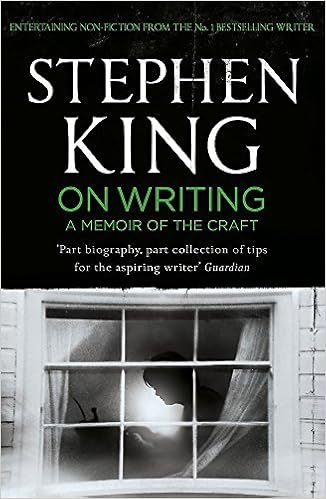In "On Writing" Stephen King takes his own advice and shows the reader how to write well, unlike most textbooks that just tell. King's specifics and details allow for easy comprehension and a smooth read. It's like he took the reader into account...
For me, this is a book I will keep in my writing toolbox. There is relevant and crucial information King shares with the readers/writers. Regardless of where someone is in their writing path I would recommend reading "On Writing," by Stephen King.

What I learned from Stephen King (Three most important things):
I feel these two pieces of advice from King go hand-in-hand. This has been one of the most difficult things for me.I think due to my last writing classes requiring more technical style my sory telling ability is lacking.
I find myself having to go back on the second draft to fill in a lot of parts that need improvement. I think this may come from a place of not truly writing with "the door shut."
Recently I have had to add 10-15% to my second draft versus cutting it as King mentions doing in his rewrites. If I truly write with the door closed in the future perhaps this will change. I do try to take out all the things that are not the story as suggested. On page 57 King mentions John Goulds advice.
On page 127 King mentions that he believes "fear is at the root of most bad writing." I think he is on to something.
For me, this is a book I will keep in my writing toolbox. There is relevant and crucial information King shares with the readers/writers. Regardless of where someone is in their writing path I would recommend reading "On Writing," by Stephen King.

What I learned from Stephen King (Three most important things):
- Writing with the door closed and rewriting with the door open/Rewrite formula.
I feel these two pieces of advice from King go hand-in-hand. This has been one of the most difficult things for me.I think due to my last writing classes requiring more technical style my sory telling ability is lacking.
I find myself having to go back on the second draft to fill in a lot of parts that need improvement. I think this may come from a place of not truly writing with "the door shut."
Recently I have had to add 10-15% to my second draft versus cutting it as King mentions doing in his rewrites. If I truly write with the door closed in the future perhaps this will change. I do try to take out all the things that are not the story as suggested. On page 57 King mentions John Goulds advice.
On page 127 King mentions that he believes "fear is at the root of most bad writing." I think he is on to something.
- The reader should always be your main concern/Know your audience/Ideal Reader (IR).
This is a theme that comes up often in Stephen Kings book. This is why details are important and being able to show the reader, not just tell the reader, the story.
Figuring out who I'm writing for is a major part of any piece of writing. I think going forward I will need to define who my IR is.
- Writing daily and reading a lot.
You must write. If you want to get better at writing you must practice. You must read, everything. Other people's writing can be your best teachers. Going forward, in order to become a better writer, I plan on reading and writing more!
I also appreciated the mention of King believing that distraction and interrruption don't seem to hurt the work in progress and may actually help it. For me, there are many distractions and often wonder about the toll it may take on my writing.
Favorite Quote:
Life isn't a support-system for art. It's the other way around.
Comments
Post a Comment